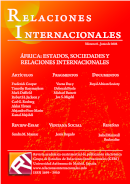Keywords:
Morocco, democratization, liberalization, political actors, neopatrimonialismCopyright (c) 2008 Kamal MEJAHDI

This work is licensed under a Creative Commons Attribution-NonCommercial-NoDerivatives 4.0 International License.
Abstract
Even before its independence, Morocco had experienced different pressures for democratization, or at least for the liberalization of its political life, as witnessed in the earlier constitutional demands in the beginning of the last century. In spite of the hardened struggle of the political opposition, however, this democratic project has proved itself to be more of a dream than a reality during the second half of the same century. The deficiency in the Moroccan democratic process is the consequence of the interaction among several factors: a poor socioeconomic structure, the presence of intransigent actors without political competence, an immature social force, and an archaic political institution. The interrelations among these characteristics have conditioned the political result: a limited form of liberalization, also known as “dictablanda”.





